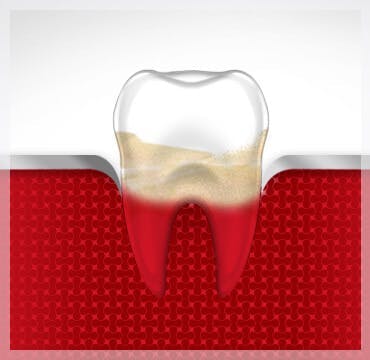If you’ve noticed that your teeth look longer and your gums seem to be shrinking, you may have receding gums. Here’s tips to help you learn about the signs, symptoms and causes of receding gums.
What Are Receding Gums?
Gums are the dense tissues that cover the jawbone and roots of the teeth to help hold them in place.1,2 Healthy gums should fit firmly and snugly around the tooth.1,2 When your gums recede or pull away from your teeth, "pockets" or gaps form between the teeth and gums, allowing disease-causing bacteria to build-up. This is known as gum recession or gingival recession, and it can eventually lead to continued recession, tooth sensitivity, bone loss and tooth loss.2
What Are the Signs of Receding Gums?
If your teeth appear to be lengthening over time, or you feel tooth sensitivity, it may be a sign that your gums are receding. As gingival tissue recedes, you may see more of the roots of your teeth.2
What causes receding gums?
Receding gums may be caused by several factors, including:2,3
- Gum disease (periodontitis)
- Genetics
- Brushing too hard, also known as chronic trauma
- Poor dental hygiene
- Grinding teeth
- Tooth misalignment
Can Receding Gums Grow Back?
The simple answer is no. If your gums are damaged by periodontitis, the most severe form of gum disease, it’s not possible for receding gums to grow back.3 When gum disease has progressed to this stage, a toothpaste alone will not stop or reverse the condition.
However, even though receding gums can’t be reversed, there are treatments and procedures that can help stop the problem from getting worse. Some common treatments include scaling the teeth to remove plaque and tartar, medication and dental surgery.2,3 In some instances, a gum graft may be necessary to re-establish your gumline and cover the exposed root.2 Schedule an appointment with your dental professional for more guidance.
How to Help Prevent Receding Gums
Good oral hygiene is the key to maintaining healthy teeth and gums. Brush twice daily with a soft-bristled toothbrush and a toothpaste designed to target plaque and reduce the early signs of gum damage like parodontax Active Gum Repair toothpaste. Make sure you’re flossing daily and regularly seeing your dental professional. If you think you’re being affected by gum disease or receding gums, contact your dental professional so they can help prevent your symptoms from getting worse.1
Source Citations:
- Periodontitis - Symptoms and causes - Mayo Clinic. https://www.mayoclinic.org/diseases-conditions/periodontitis/symptoms-causes/syc-20354473. Accessed 6/10/23.
- Gingival recession: causes and treatment. Journal of the American Dental Association. https://jada.ada.org/article/S0002-8177(14)63227-X/fulltext. Accessed 9/20/23.
- Gingival recession: its causes and types, and the importance of orthodontic treatment. National Center for Biotechnology Information. https://www.ncbi.nlm.nih.gov/pmc/articles/PMC4944726/. Accessed 9/20/23.





